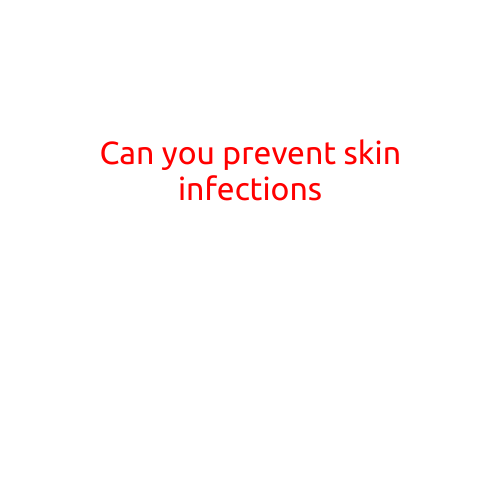
Can You Prevent Skin Infections?
Skin infections are a common occurrence, caused by a variety of factors such as bacteria, viruses, and fungi. While some skin infections are minor and self-limiting, others can be more serious and even life-threatening if left untreated. The good news is that many skin infections can be prevented by taking simple steps to maintain good skin hygiene and reduce the risk of infection.
What causes skin infections?
Skin infections are caused by a variety of microorganisms, including:
- Bacteria: such as Staphylococcus aureus, Streptococcus pyogenes, and Mycobacterium tuberculosis
- Viruses: such as herpes simplex, human papillomavirus (HPV), and varicella-zoster virus
- Fungi: such as Candida albicans, Malassezia furfur, and Trichophyton rubrum
How to prevent skin infections
While it’s not always possible to completely prevent skin infections, there are many ways to reduce your risk:
- Maintain good skin hygiene: Wash your skin regularly with soap and water, especially after exercising, showering, or engaging in activities that cause perspiration.
- Use antiseptic lotions and creams: Apply antiseptic lotions or creams to minor cuts and scratches to prevent infection.
- Avoid close contact with people who have skin infections: If someone in your household has a skin infection, take steps to avoid close contact with them.
- Wear protective clothing: Wear protective clothing such as gloves and masks when caring for someone with a skin infection.
- Keep wounds clean and covered: Keep wounds clean and covered with a bandage to prevent bacteria and other microorganisms from entering the wound.
- Avoid sharing personal items: Avoid sharing personal items such as towels, razors, and clothing with someone who has a skin infection.
- Get vaccinated: Get vaccinated against vaccine-preventable skin infections such as HPV and chickenpox.
Preventing skin infections in specific situations
There are certain situations where skin infections are more likely to occur, such as:
- Swimming pools: Avoid swimming in pools that are not well-maintained or contaminated with urine or feces.
- Tattoos and piercings: Choose a reputable and licensed tattoo or piercing studio, and follow proper aftercare instructions.
- Atopic dermatitis: Follow a strict skin care regimen and avoid scratching or rubbing affected areas.
- ** Burns**: Follow proper wound care guidelines and avoid bacterial contamination.
Conclusion
While it’s not always possible to completely prevent skin infections, there are many ways to reduce your risk. By maintaining good skin hygiene, avoiding close contact with people who have skin infections, and taking steps to prevent infection in specific situations, you can reduce your risk of developing a skin infection. If you do develop a skin infection, seek medical attention promptly to prevent complications and ensure proper treatment.





